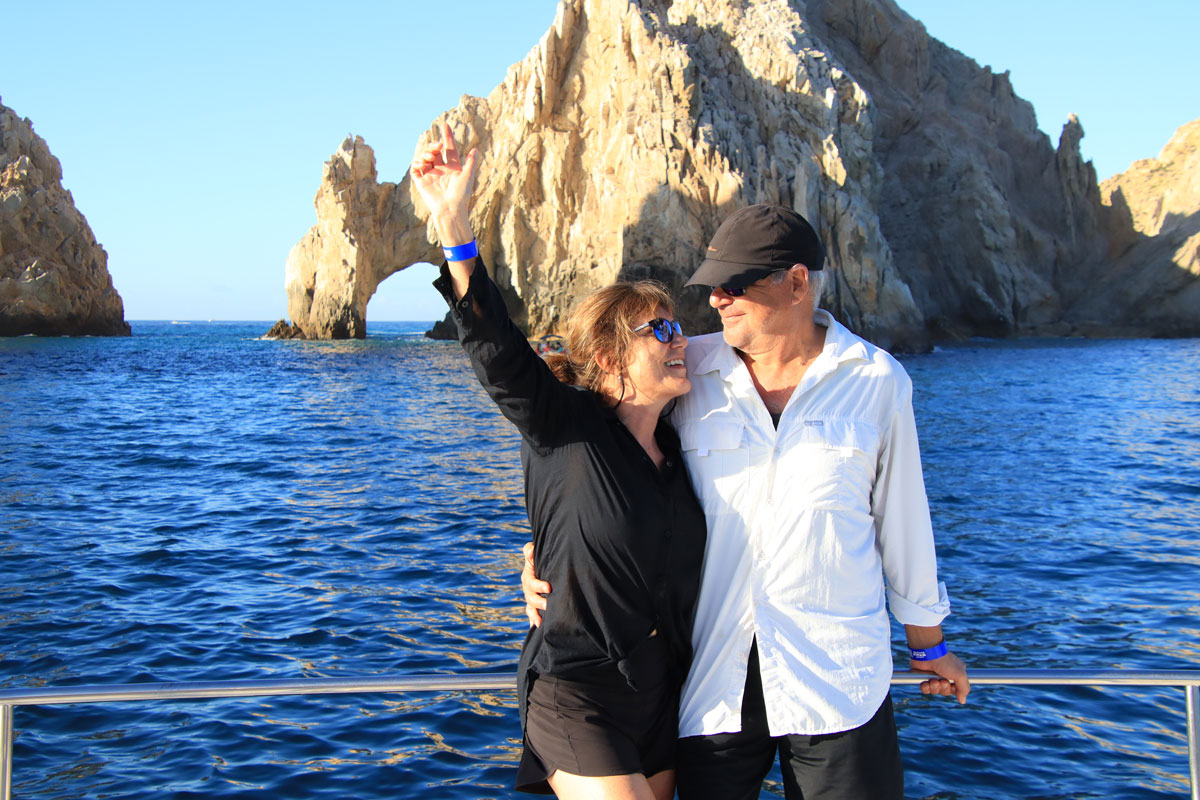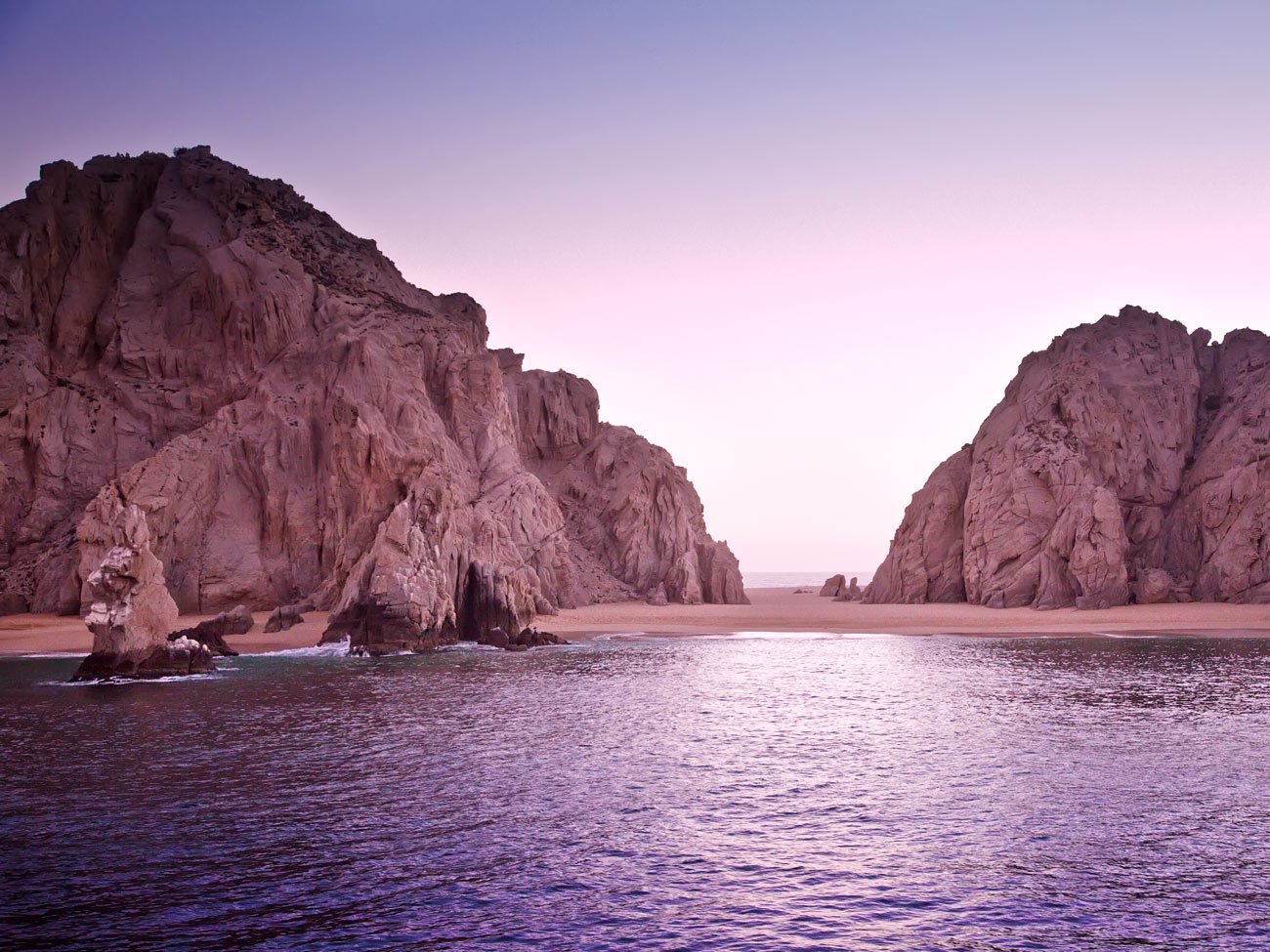23 Essential Cabo Travel Tips for First-Timers (by Insiders!)
Planning your first Cabo getaway? Get ready… This sun-drenched hotspot is anything but ordinary!
Perched at the southern tip of the Baja Peninsula, Cabo is where “the desert meets the sea” – and where we keep returning, year after year.
It’s got golden beaches, luxury resorts, buzzing nightlife and some seriously good farm-to-table eats. Fair warning, though. It’s also Mexico’s priciest resort area.
In this post, we share 23 useful Cabo travel tips for first-time visitors – including money-saving hacks, safety advice and insider suggestions on what to do. They’re drawn from our many visits and reader insights from our Cabo Visitor Facebook community.
🏖️ Our 5 must-know Cabo travel tips
Note: Dollar figures quoted below are in USD.
Contents: Travel tips for visiting Cabo
Tips on telling the “Cabos” apart
Tips on the best time to visit
Tips on safety, money and local know-how
First, know your “Cabos”!
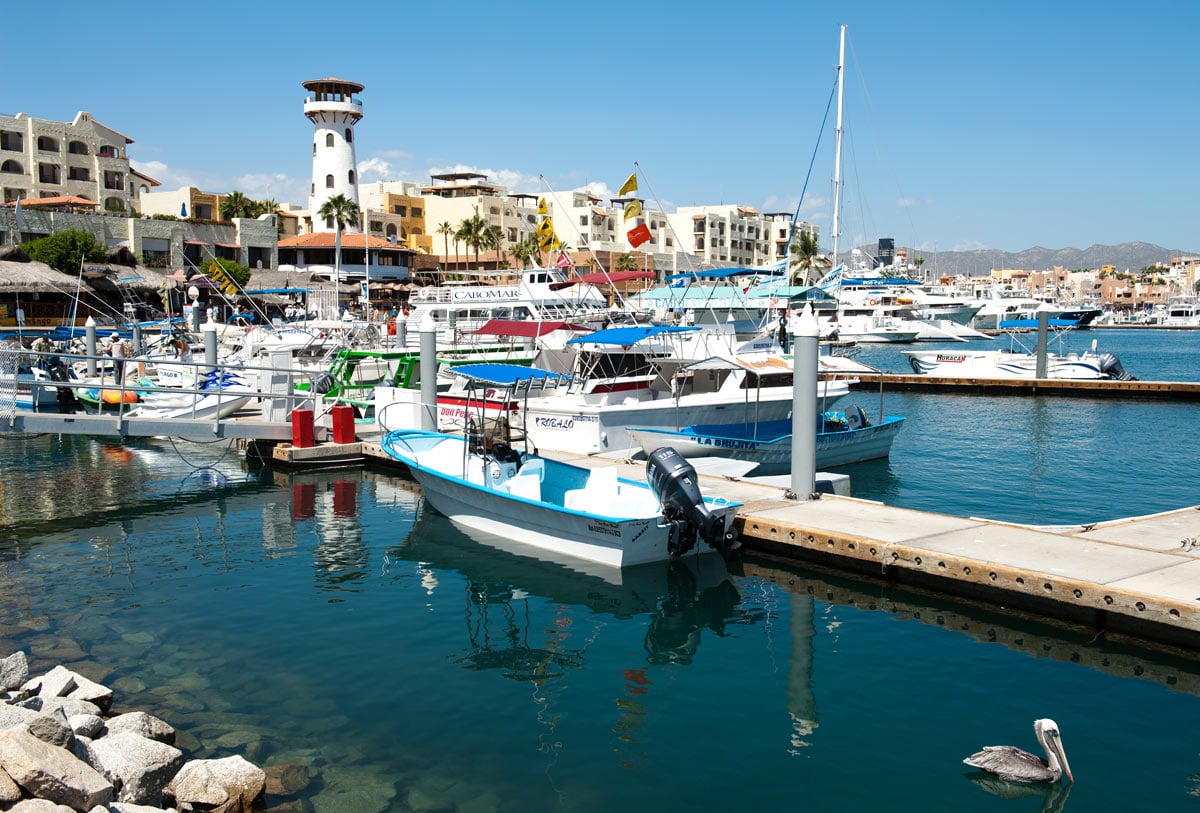
Before we get to our tips for traveling to Cabo San Lucas or Los Cabos, let’s clear up some geography. There’s more than one “Cabo.” See, we already used a few of them here in this paragraph alone!
“Los Cabos” refers to two separate towns – Cabo San Lucas and San Jose del Cabo – plus the 20-mile coastal Tourist Corridor connecting them.
When you hear “Cabo,” it could mean Cabo San Lucas specifically or the entire Los Cabos region.
➡️ We’ll be clear here. We’ll use “Cabo” and “Los Cabos” interchangeably, but when talking about the actual town of Cabo San Lucas, we’ll spell it out from now on.
Tips on when to go
1) Avoid Cabo’s hurricane season (August and September)
The “official” Cabo hurricane season runs from mid-May through November, but most storms hit in August and September. We personally wouldn’t visit then – it’s very humid and hot. (But if you love fishing, September is a good month!)
So when’s the best time for a Cabo vacay?
- For winter sun – December to April is great for escaping the North American chill. But it’s peak season, so expect higher prices and crowds.
- For fewer crowds and deals – We recommend the shoulder seasons – late spring (May and June) and fall (October and November) – for hot-but-pleasant weather, lower rates and fewer people.
➡️ With almost-bath-warm sea temps in the low 80s F (27 to 28 C) – warmer than most pools – October/November is ideal for snorkeling and scuba diving. We especially enjoyed scuba diving at Cabo Pulmo (a 2-hour drive from Cabo) this time of year.
2) Bring a sweater in winter
Cabo can sometimes feel chilly in winter (it’s not hot like Cancun or the Caribbean).
On our first Christmas visit, we only packed light clothes – and regretted it on cool evenings. (There’s a reason that restaurants have patio heat lamps!)
In January, Cabo’s coolest month, it’s hot enough to sunbathe by day, but nighttime temps can dip to 53 F (12 C). And early mornings in January and February often stay nippy until the sun heats everything up by about 9:00 am.
➡️ When packing for a winter visit, toss in a shawl, light sweater, long pants and closed-toe shoes.
Tips for getting around
3) Book airport transfers in advance
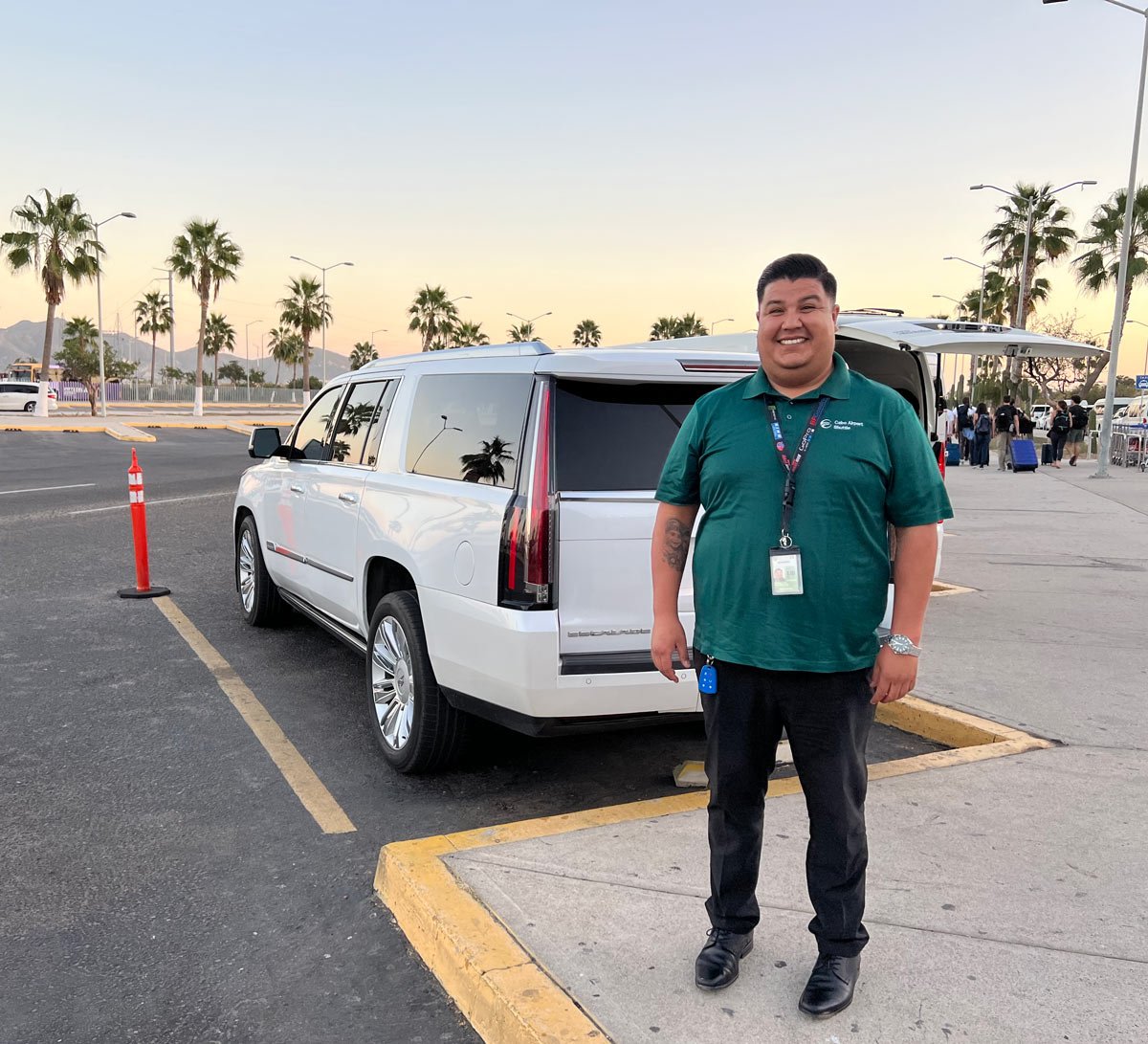
One of our top Los Cabos travel tips for a first visit to Cabo? Pre-book an airport transfer. It’s more comfortable and often cheaper than a taxi.
Many transportation companies offer reliable transfer services, with airport greeters and rides in A/C mini-vans or SUVs.
- Shared shuttle – You’ll share the ride with up to 8 to 10 passengers. You may wait 30 minutes at the airport for others and could be the last drop-off. But it’s cheaper for 1 or 2 people.
- Private transfer – You’ll be driven directly to your hotel. Perks often include cold bottled water, refreshing towels and even complimentary beer. For groups of 3 to 4 or more, private transfers often work out cheaper per person too.
➡️ These are the least expensive and best value options we’ve found (on Viator, with free cancellation up to 24 hours before):
- Roundtrip shared shuttle service – $44 USD p.p. We’ve used this service and recommend it for an economical transfer for a solo traveler or a couple.
- Roundtrip private transfers (for a group of up to 5 people) – $180 USD per group. We’ve used Cabo Airport Shuttle (which offers these transfers) and the service is excellent.
4) Use Uber (but not from the airport)
It’s safe, easy and often cheaper than taxis. We use Uber ourselves – for example, to get back to our Medano Beach resort after grocery shopping at Walmart or the Super Chedraui in Cabo San Lucas – with no issues.
A couple of catches, though:
- If you’re staying along the Corridor, getting an Uber from your resort can be tricky – The local taxi union has a firm hold in Los Cabos and tries to make things difficult for Uber. So you may need to meet your driver outside the resort gates. If that’s too much hassle, grab a taxi out and Uber back. They can usually drop you right at your lobby.
- Ubers aren’t allowed to pick up at the airport – That’s why we recommend pre-booking an airport transfer.
➡️ Uber works well for pick-ups within Cabo San Lucas and San Jose del Cabo.
5) Take the public bus between Cabo San Lucas and San Jose del Cabo
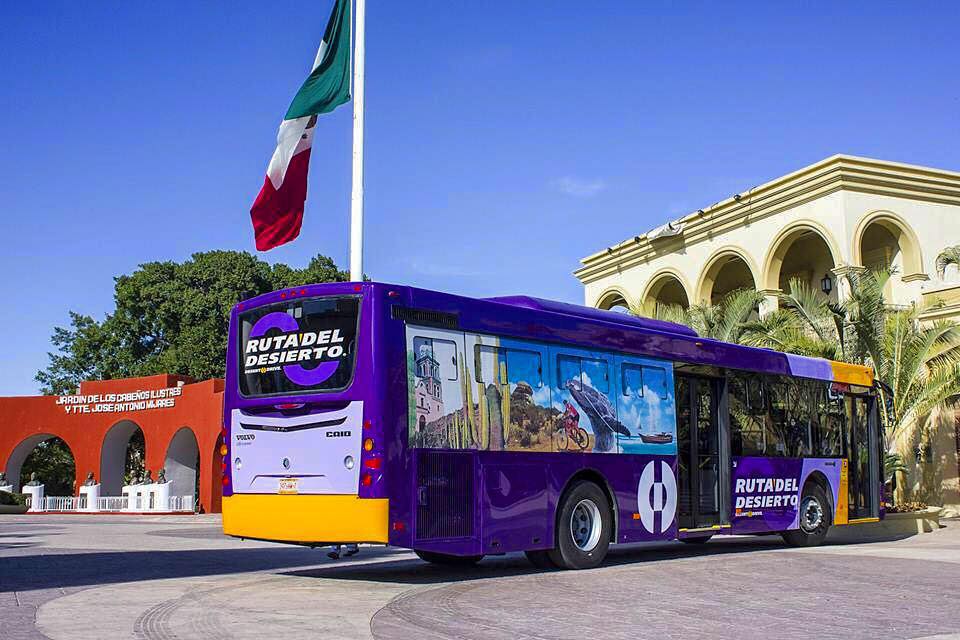
The local purple-and-orange Ruta del Desierto buses run frequently along the main highway between the two towns. They’re safe and most are clean and air-conditioned.
At just a few dollars per ride, they’re a budget-friendly way to get from one town to the other. (When we have time, we sometime ride the bus to San Jose del Cabo, rather than taking an Uber – it’s about a one-hour ride.)
You can even make like a local and take the bus to and from the airport!
➡️ Catch the bus from the stop just outside the Puerto Paraiso Mall in Cabo San Lucas or outside La Comer supermarket in San Jose del Cabo (on Highway #1).
6) There’s no need to rent a car for your whole stay
It’s easy to explore without a car. Taxis, Ubers and walking work well for getting around Cabo most of the time.
Chances are you’ll want to spend some days just relaxing at your resort’s beach or pool. Also many tours include hotel pick-up. So no car will be needed these days.
➡️ Consider renting a car just for day trips. (We’ve used Discover Cars for discounted rental rates.)
Tips on where to stay
7) Cabo San Lucas or San Jose del Cabo? Know the difference
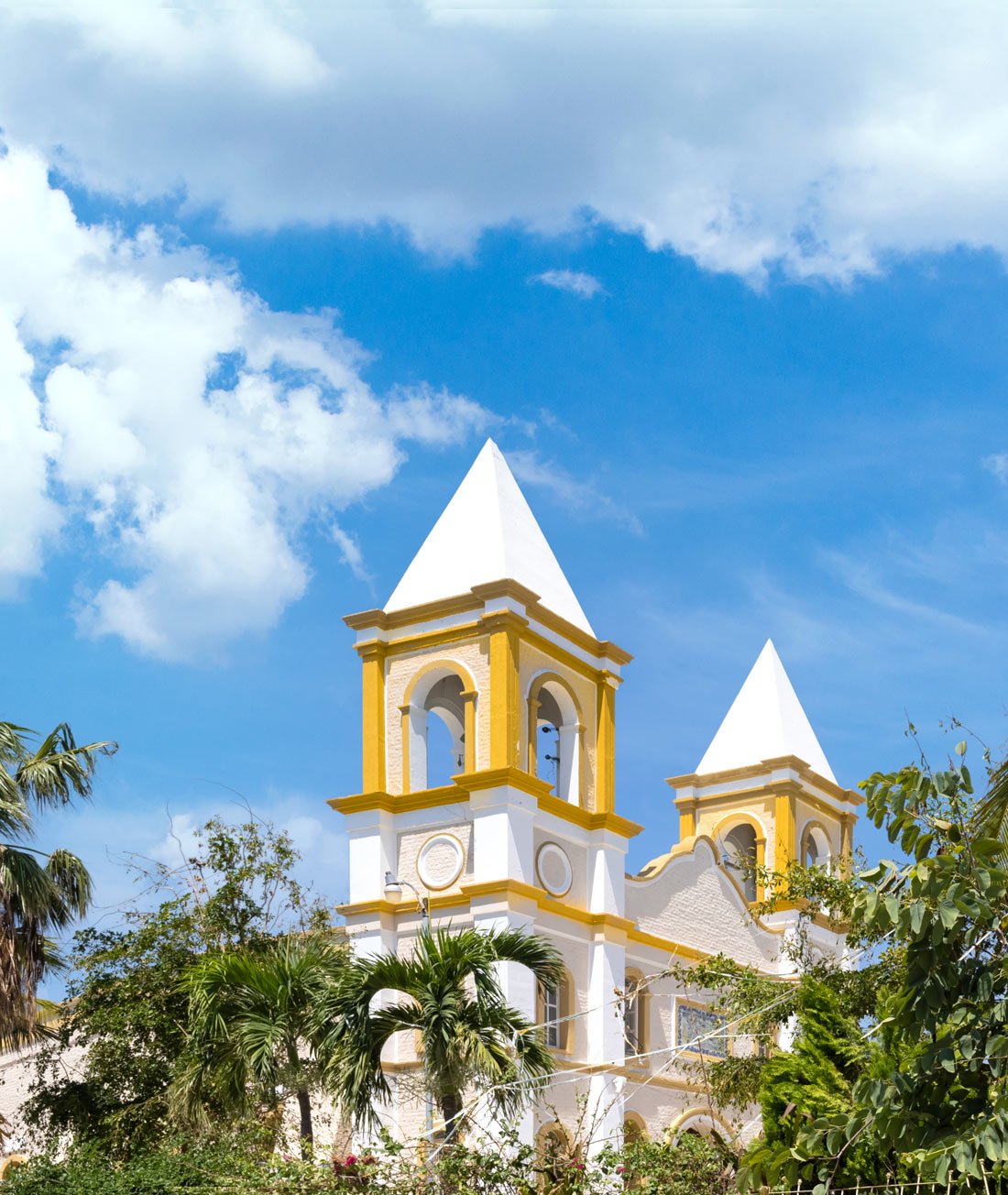
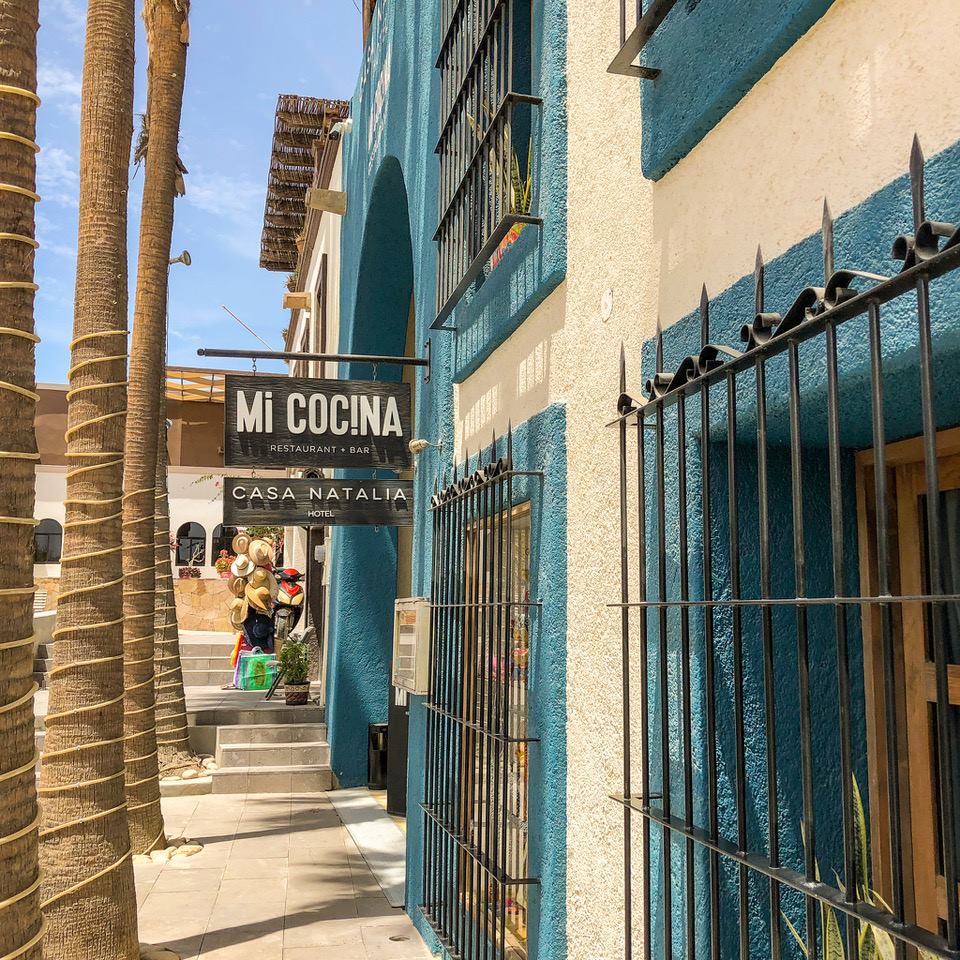
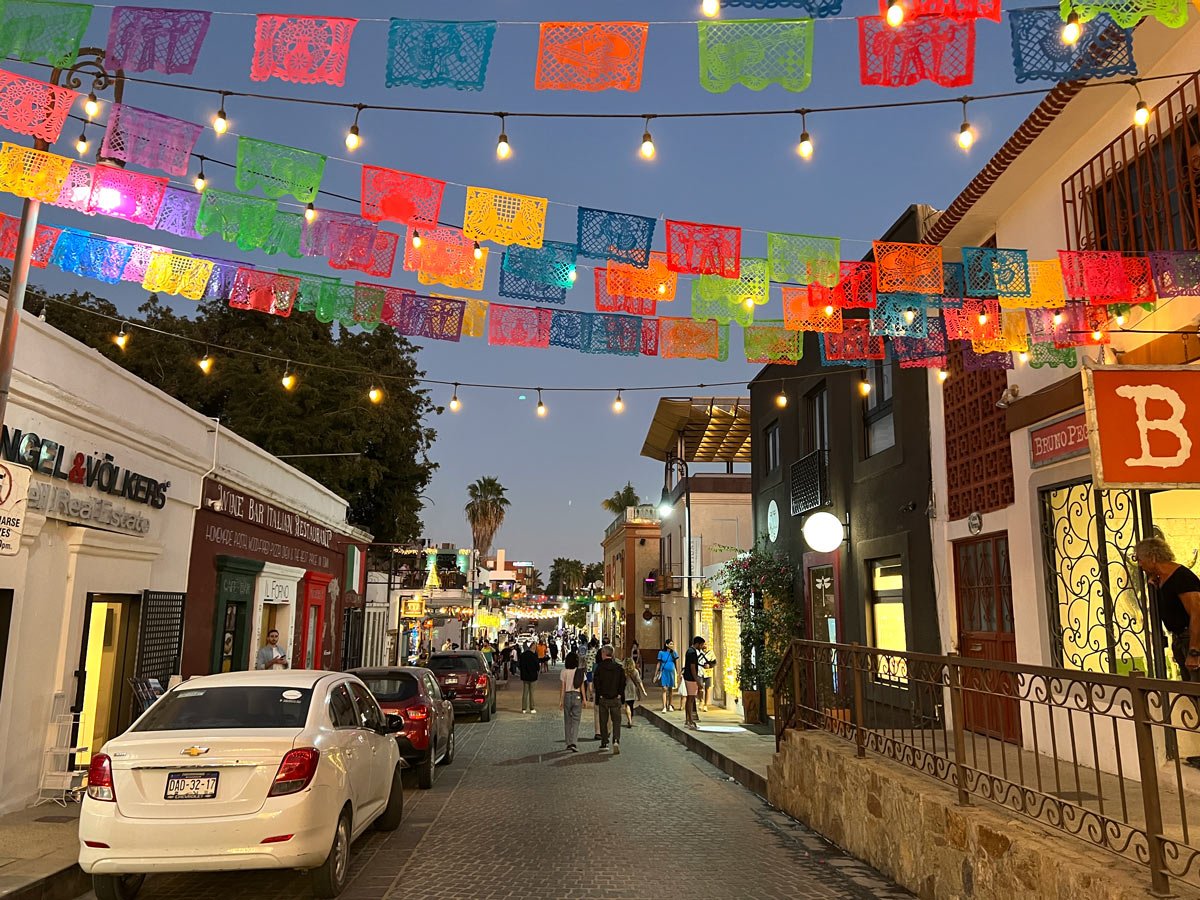
Trying to decide between Cabo San Lucas or San Jose del Cabo? Here’s the difference:
- Cabo San Lucas – It’s lively and touristy. Think bustling beaches, waterfront bars and plenty of action. Its marina is the hub for water activities like snorkeling, boat tours and jet-skiing.
- San Jose del Cabo – Quieter and more authentic, it has a charming historic center, full of art galleries, cobblestone streets and romantic restaurants.
➡️ Not sure which to pick? Our guide on where to stay in Cabo breaks down the best areas (including the Tourist Corridor). Maybe split your time between both towns for the best of both worlds!
8) Decide if “all-inclusive” is right for you
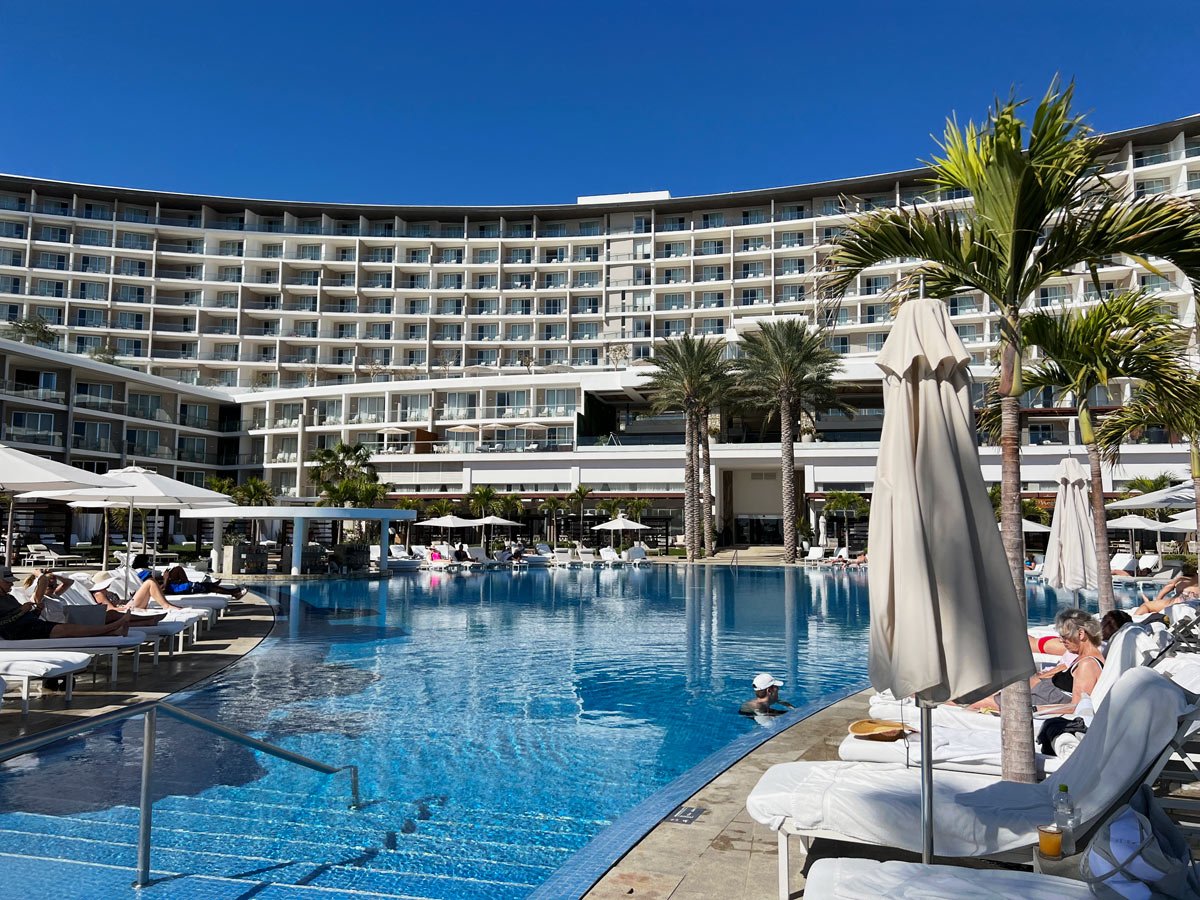
Cabo has excellent all-inclusive resorts (especially along the Tourist Corridor). They’re great if you want a hassle-free stay – no thinking about meal costs or where to eat, just lots of pool-and-margarita time.
But both Cabo San Lucas and San Jose del Cabo also have amazing restaurants.
If you’re staying near either, you can easily walk (or take an inexpensive Uber) to them. Maybe sample fresh fish tacos one day and splurge on a fancy dinner the next?
➡️ If you’re a foodie or plan to explore a lot, you might want to skip the all-inclusive resort option and enjoy Cabo’s dining scene.
9) Check resort service fees before booking
Many Cabo resorts charge mandatory nightly service or resort fees.
These cover things like Wi-Fi, bottled water and pool towels – even if you don’t use them. Sometimes they’re baked into the total rate; other times, they’re tacked on as a percentage of your bill or as a fixed nightly amount.
For example:
- Corazon Cabo Resort & Spa charges a 15% resort fee – covering Wi-Fi, bottled water, spa relaxation zone access, fitness center, valet parking and more.
- Cabo Azul’s rates include a $60 USD daily resort fee – for WiFi, parking, fitness classes, sport equipment rentals, turn-down service and a $25 gratuity for staff.
- Waldorf Astoria Pedregal Los Cabos applies a 15% service fee – which can add hundreds to your stay.
➡️ With service or resort fees, a $500 room could easily become $575 or more per night. Check the fine print before booking.
Tips on safety, money and local know-how
10) Carry pesos (but USD is widely accepted)
U.S. dollars are accepted pretty much everywhere in Cabo – from beach bars to souvenir stalls. But you’ll often get a better deal if you pay in pesos, especially at smaller shops, taco joints and gas stations.
ATMs are the easiest way to get pesos once you arrive. Avoid the freestanding ones in tourist zones – bank ATMs are safer and have better rates.
➡️ A few pesos also come in handy for tipping valet drivers, bathroom attendants and the person bagging your groceries. So yes, bring a credit card – but don’t skip the local cash!
11) Tipping is customary – 15% to 20% is appreciated

Tipping is part of the culture in Cabo, and many locals rely on tips to support their families.
Aim to tip 15% to 20% at restaurants. But check your bill! Some places automatically add a “service charge.” If so, you may just want to top it up a little more if the service was great.
Also don’t forget smaller service workers, like the person bagging your groceries. They’ll be grateful for a few extra pesos too.
➡️ Tip in cash to ensure the person providing the service gets the gratuity.
12) Watch for timeshare sales pitches (especially at the airport)
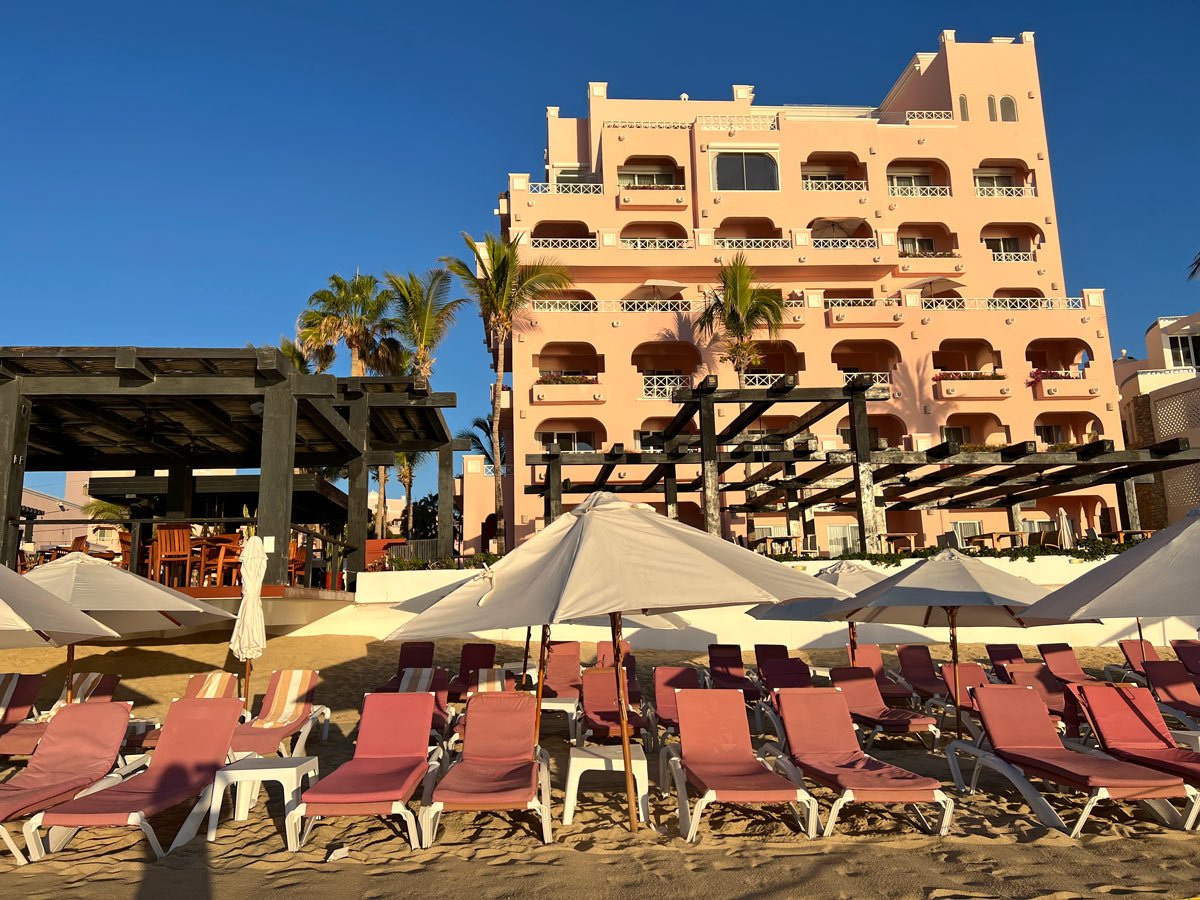
Many resorts in Cabo are timeshares, and their salespeople are everywhere – we’ve even been approached in the grocery stores!
The airport is their prime hunting ground.
After clearing customs, don’t stop for anyone offering “free” rides or tours – unless you genuinely want to sit through a sales pitch. Just keep walking until you exit the airport. All official taxis and transfer drivers wait outside.
If you do sign up, be prepared to lose almost a full day between the transfers and repeated “No thanks” to smooth-talking sales staff. Yes, you might score a free sunset cruise or cash. But is it worth your vacation time?
➡️ Confession: We’ve been tempted and bought (then cancelled). If you don’t want to get roped in like we have, be firm and politely decline any offers to attend a timeshare presentation, no matter how enticing the “free gift” sounds.
13) Cabo is safe, but stay street-smart
Cabo is one of the safest places to visit in Mexico – especially if you stick to tourist areas and resort zones. We’ve visited many times and always felt completely at ease.
Still, it’s smart to use common sense, just like you would anywhere:
- Don’t flash expensive jewelry or wads of cash.
- Don’t wander down dark alleys at night.
- Be cautious if partying late – keep an eye on your drink and stick with friends.
- If you’re renting a car, avoid driving on rural roads after dark (livestock sometimes wander onto highways).
➡️ Cabo is safe, but a little street-smarts go a long way.
Tips for enjoying Cabo’s beaches safely
14) Not all beaches are safe for swimming
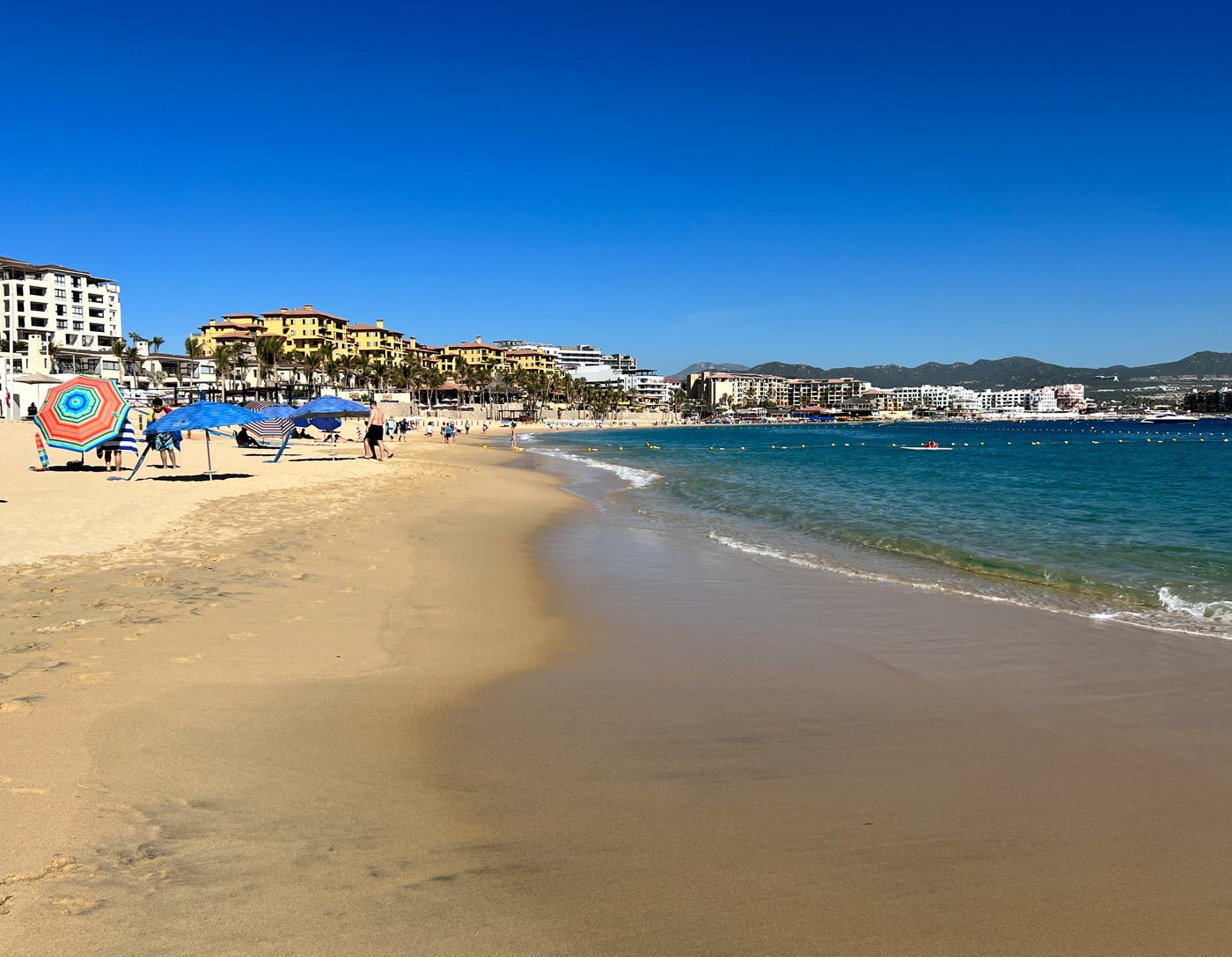
Cabo’s beaches may be stunning – but many aren’t safe for swimming.
Blame the powerful rip currents and strong waves. The rips can sweep even strong swimmers out to sea. The Pacific side is especially dangerous.
Pay attention to the beach flags. “Red” means stay out of the water. “Black” means don’t even step foot on the beach (usually due to storms or hurricanes).
➡️ Stick to safe swimming beaches like:
- Medano Beach – Cabo’s most popular swimmable beach, with lots of fun beach clubs
- Playa Palmilla – Quieter and great for families (bring your own beach chairs and shade)
- El Ganzo Beach – A chill beach, with a handful of low-key beach clubs
Also see our guide on Cabo’s best resorts with a swimmable beach.
15) Use reef-safe sunscreen
Cabo cares about its marine life – and so should you! Use only biodegradable reef-friendly sunscreen, especially in protected areas like Cabo Pulmo National Park.
These sunscreens are free of harmful ingredients like oxybenzone and octinoxate, which damage coral reefs. Mineral-based sunscreens with zinc oxide or titanium dioxide are a good bet.
➡️ We’re fans of Sun Bum’s reef-safe sunscreen. It’s dermatologist-approved, and the coconut-banana scent smells lovely too!
16) Protect yourself from the sun – it’s intense
Cabo’s sun doesn’t mess around. Even on cloudy days, UV levels can be high. It’s easy to burn without realizing it.
So along with sunscreen (which you should reapply often), wear a wide-brimmed hat and UV-protective sunglasses. Also consider a rashguard or cover-up if you’re out on the beach for long.
➡️ We always go swimming and snorkeling now with long-sleeve rashguards – no more burnt backs!
Tips on what to do and see
17) Go whale watching (in winter)
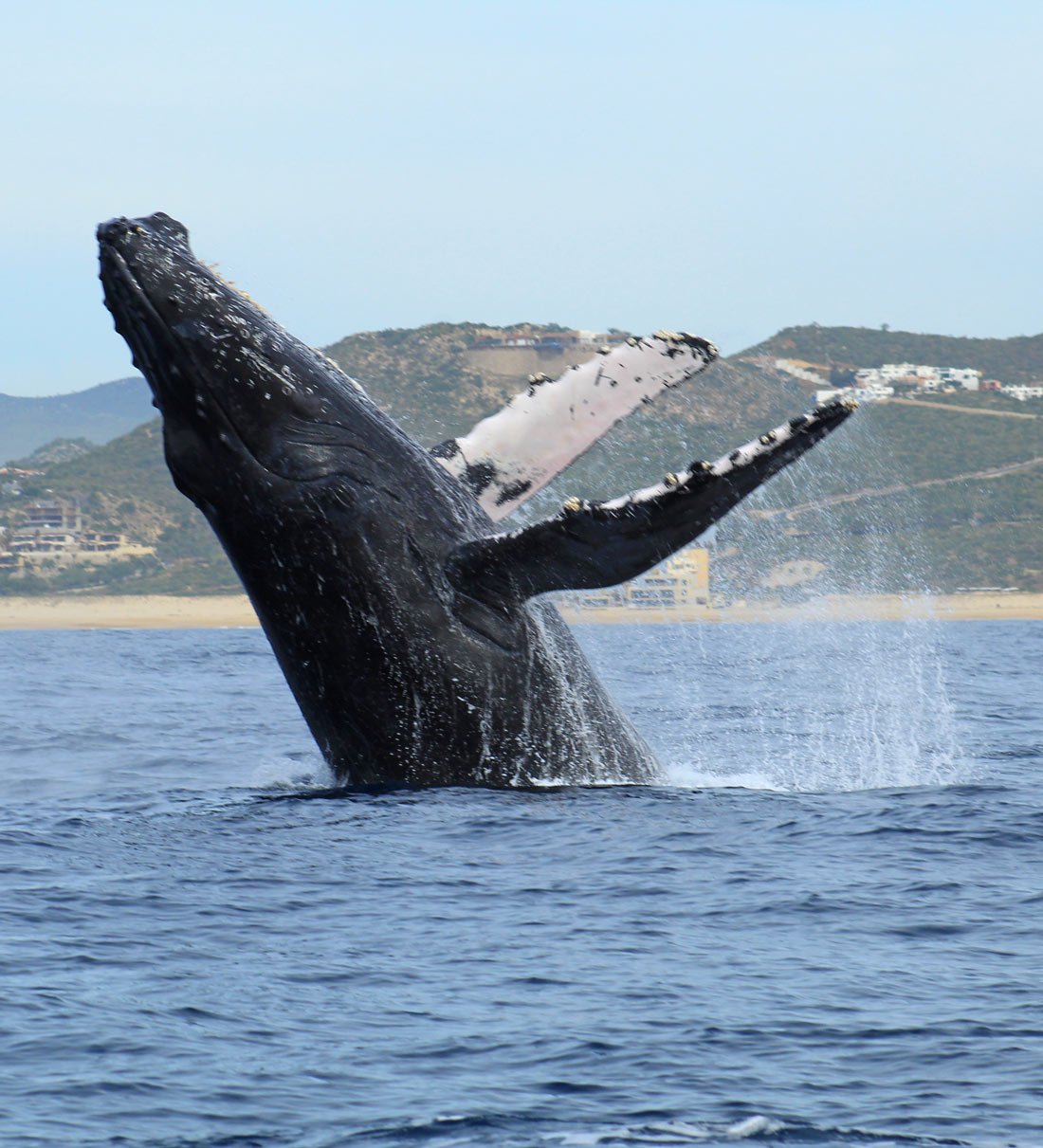
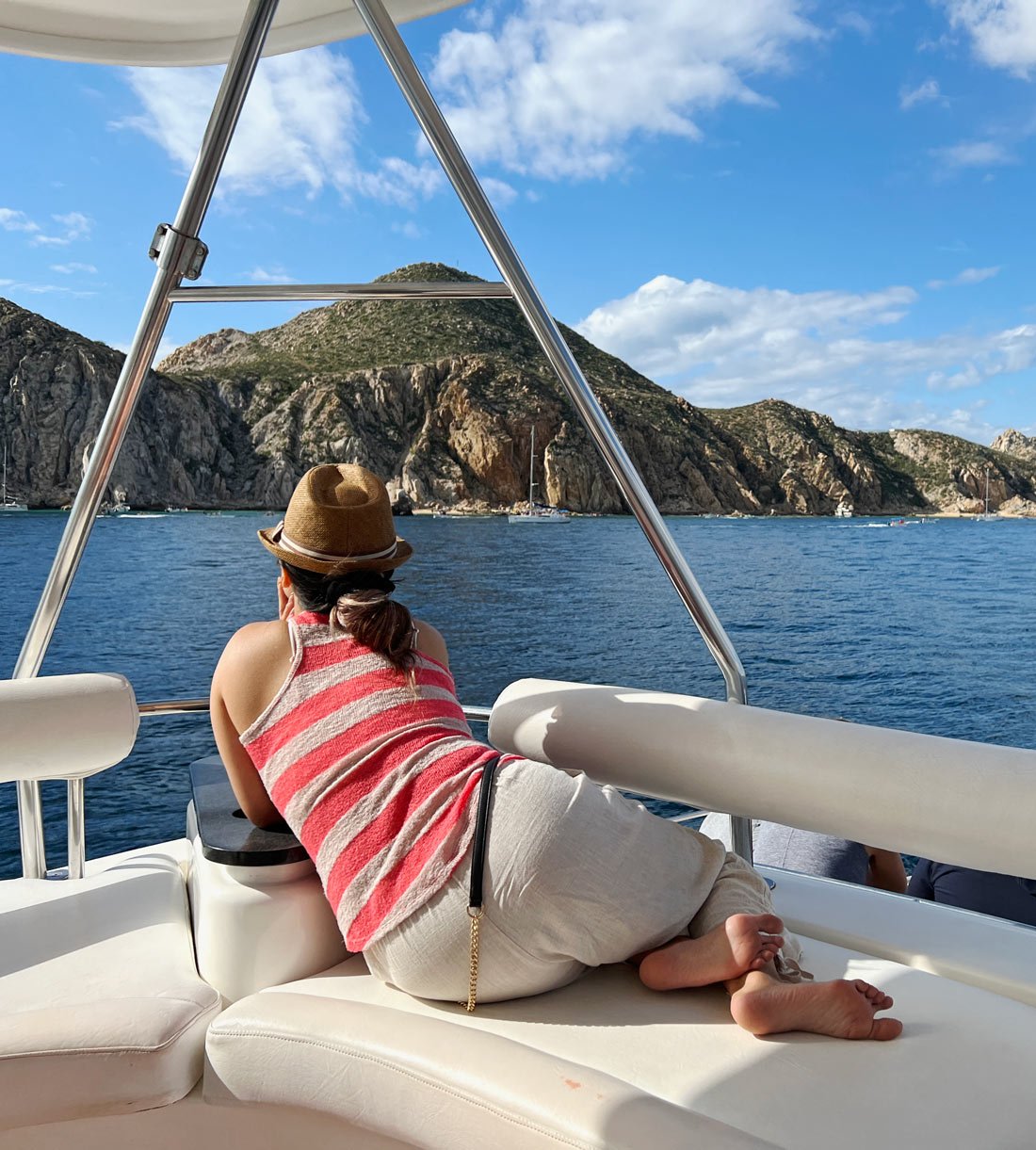
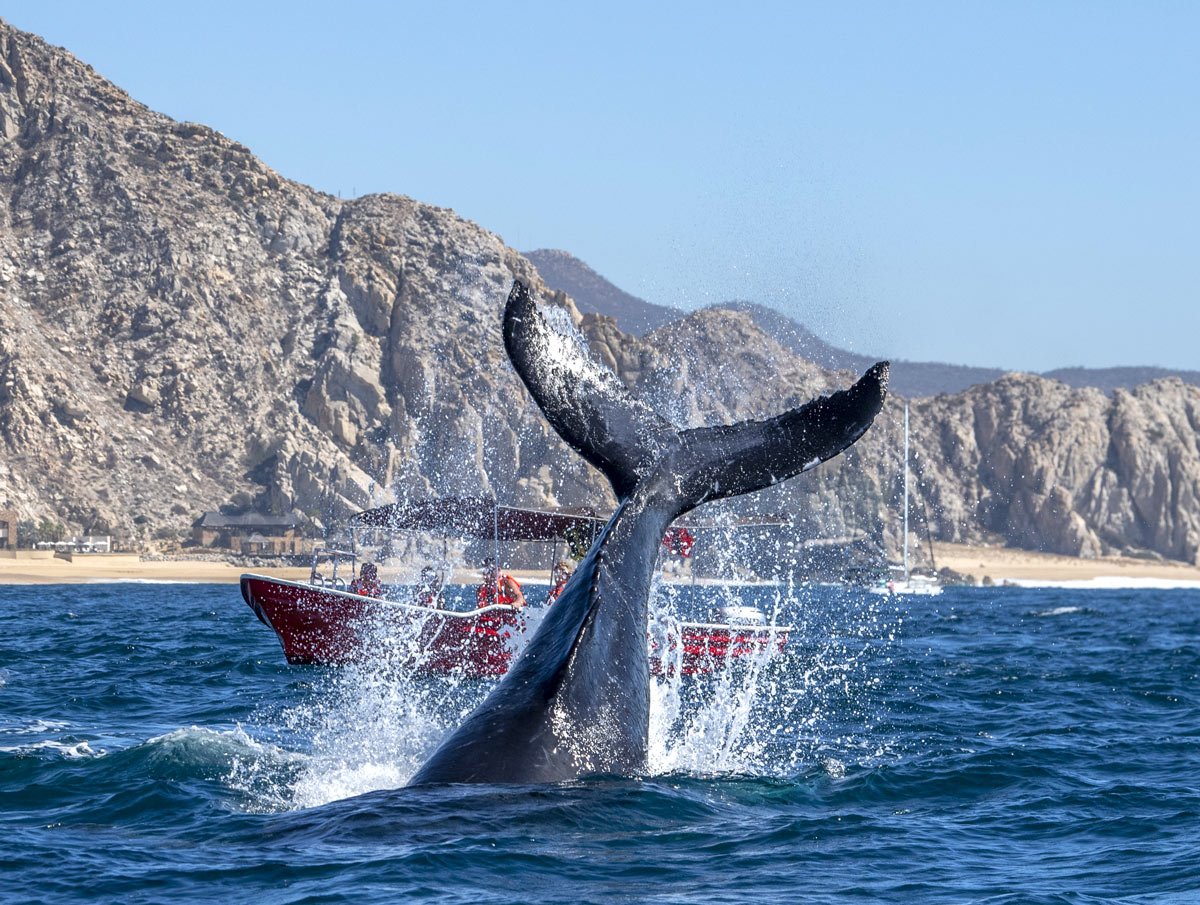
If visiting in winter, one of our top Cabo San Lucas travel tips is simple… Go whale watching!
From mid-December to mid-April, Cabo turns into a whale watching wonderland. Humpbacks, gray whales – even blues – migrate here to give birth and play in the warm Baja waters.
Whale watching boat tours leave from the town’s downtown marina.
We’ve seen whales breach, tail-slap and spout. Bonus: Some tours use hydrophones so you can hear the whales sing underwater!
➡️ Book your tour in advance (especially in peak winter months). Mornings are usually calmer, so opt for an early tour if you’re prone to seasickness or want a smoother ride.
Three tours we highly recommend:
- Luxury catamaran cruise – Super comfy with shaded seating and mimosas!
- Zodiac whale watching adventure – Fast, fun and thrilling, and you get closer to the action
- Large boat with brunch – A smooth stable ride, with food and drinks on board
18) Take a boat tour to Land’s End and the Arch
You’ll also want to hop on a boat tour to Land’s End and the famous Arch (El Arco)! You’ll cruise past dramatic rock formations, Lover’s Beach and the sea lion colony – all postcard-worthy sights.
It doesn’t have to cost a lot either. Water taxis from the marina are the budget-friendly option.
Want something cooler? Try a unique totally-transparent boat for wrap-around views of the fish below!
Or treat yourself to a luxury sailing-and-snorkeling Land’s End tour, complete with drinks and snacks.
➡️ Don’t forget your camera – seeing the Arch from the water is one of those classic “You’re really in Cabo!” moments.
19) Escape Cabo for a day
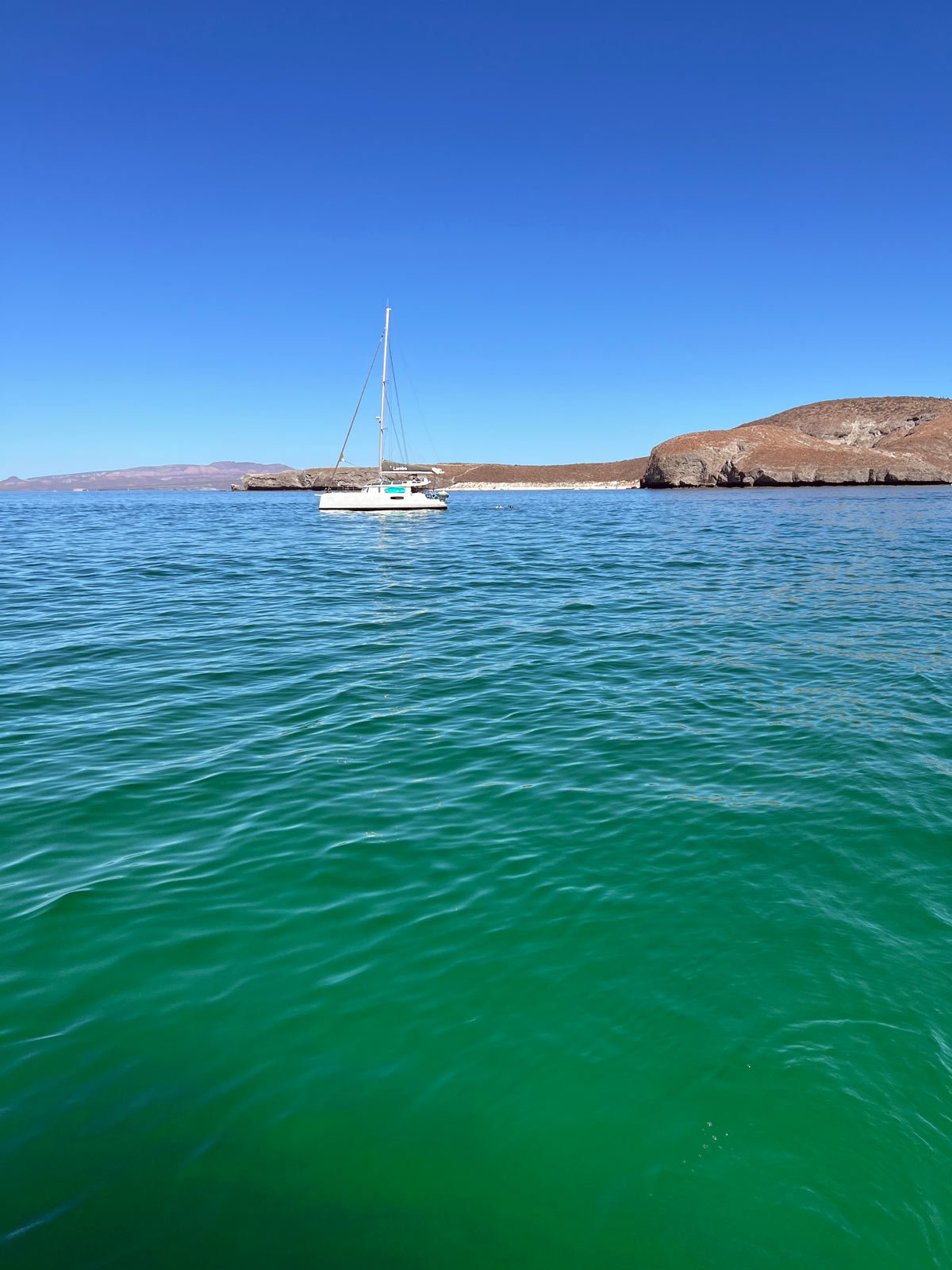
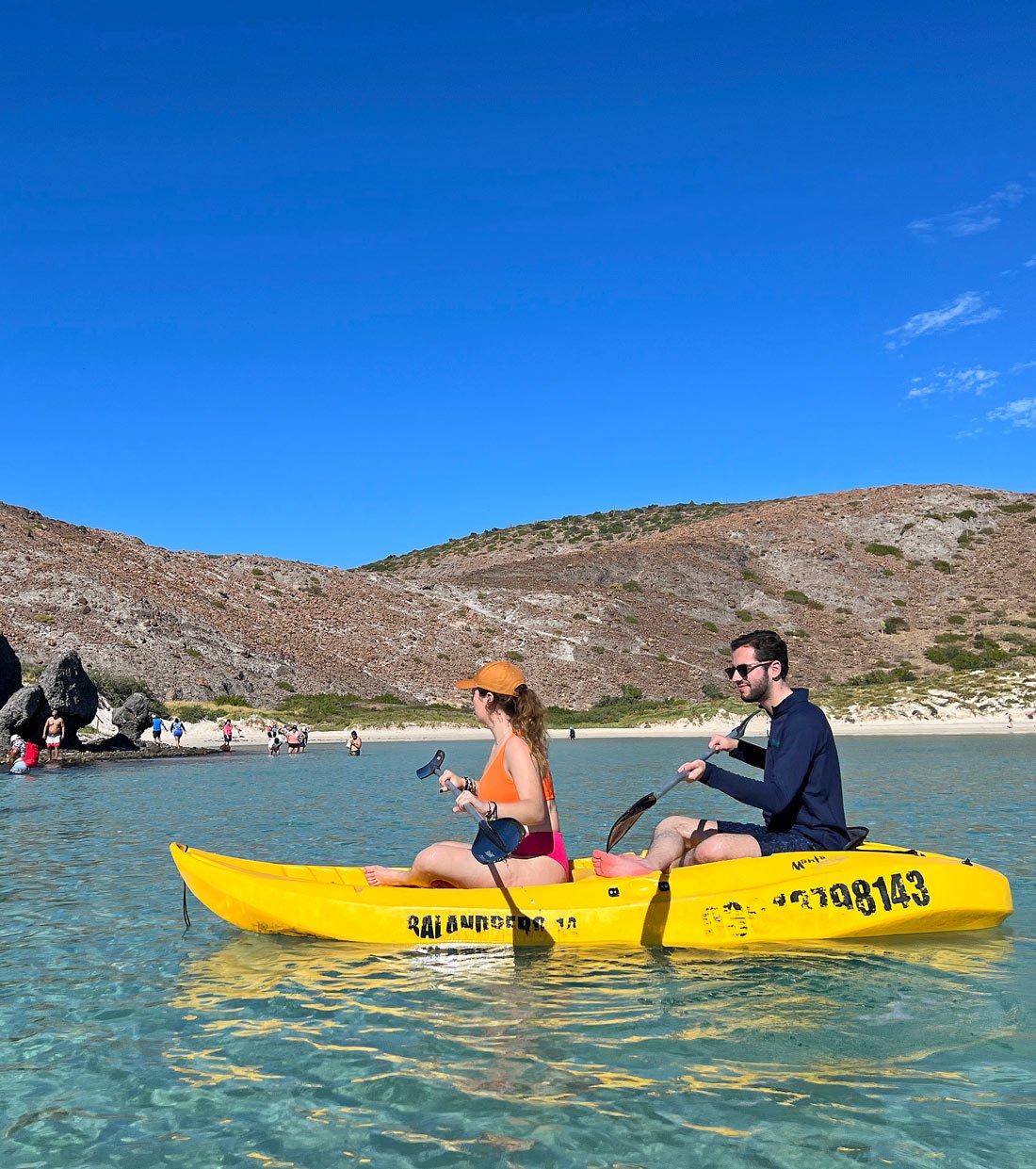
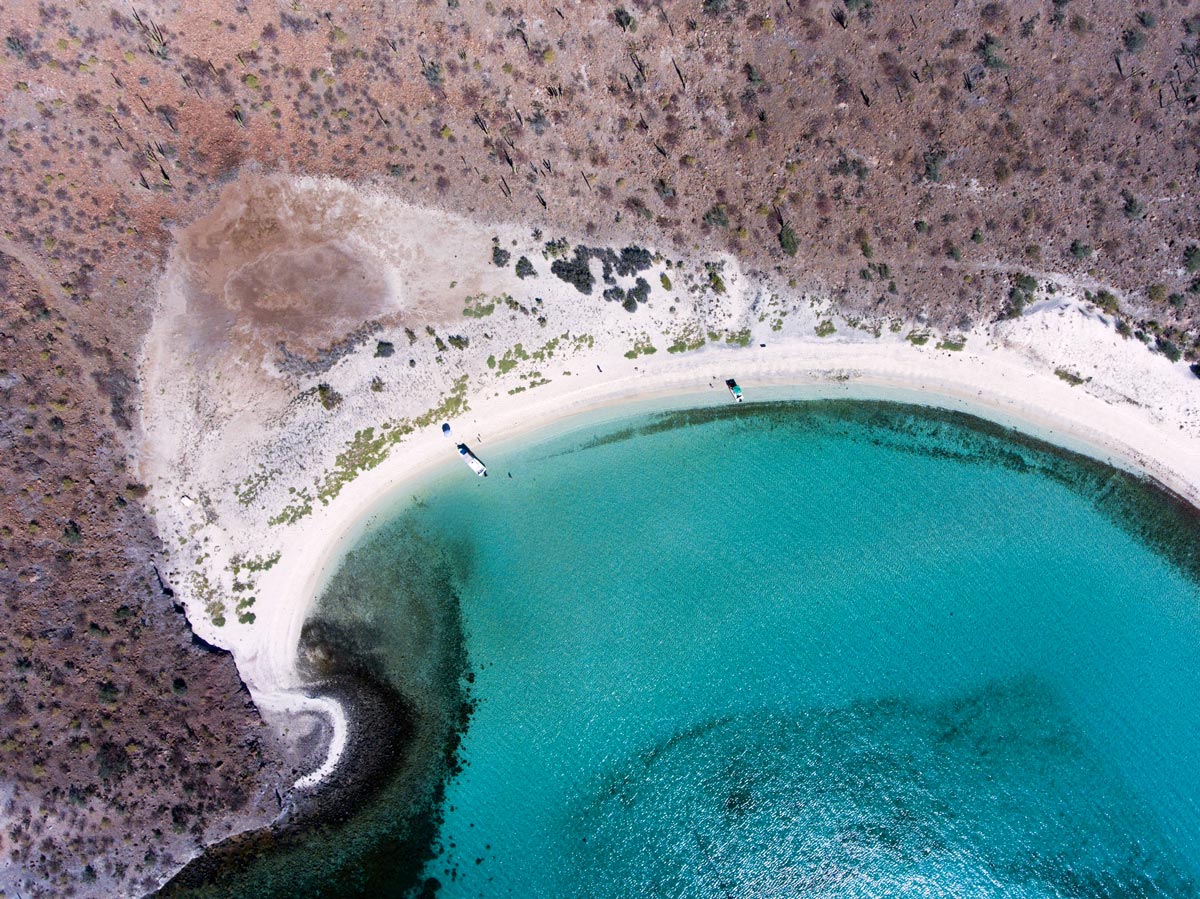
There’s more to Baja than just Cabo’s beaches and bars. Plan a day trip! A few of our favorite getaways:
- Todos Santos – An hour up the Pacific Coast, this arty Pueblo Magico oozes charm with its colonial buildings, galleries, and cute cafés. Todos Santos is also a surfing hotspot.
- Balandra Beach – Near La Paz, this shallow turquoise bay looks like something out of the Maldives. Wade out for ages in warm knee-deep water. (We loved this catamaran sailing-and-snorkeling tour of Balandra, with transfers from Cabo San Lucas.)
- Hike Fox Canyon – Craving nature? Trek to a hidden waterfall in the Sierra de la Laguna mountains and swim in cool freshwater pools in Fox Canyon. Just bring sturdy shoes and your sense of adventure!
➡️ See our guide on day trips from Cabo for more ideas.
20) Don’t miss San Jose del Cabo’s Thursday Art Walk
If you’re in Cabo between November and June, head to San José del Cabo on a Thursday evening. That’s when its charming Gallery District comes alive for the weekly Art Walk.
Wander cobblestone streets closed to traffic, pop into contemporary galleries, sip free wine (yes, really!) and meet local artists. It’s a lively, artsy vibe – with street musicians, pop-up stands and stylish boutiques staying open late too.
➡️ Free fun doesn’t get better than San Jose del Cabo’s Art Walk!
Tips on eating and drinking in Cabo
21) Don’t drink the tap water
Stick to bottled or filtered water. Cabo’s tap water isn’t considered safe to drink – even most locals avoid it.
A few more tips:
- You should be okay brushing your teeth with tap water; just don’t swallow it.
- Order drinks sin hielo (no ice) if you’re unsure about the source.
- You can stock up on bottled water (at inexpensive prices) at Walmart, Costco, grocery stores and local corner shops.
➡️ At resorts and restaurants, it’s safe to drink house water (agua de la casa) poured at your table. It typically comes from large sterilized garaffones (refillable bottles) of filtered water.
22) Make reservations for restaurants
Cabo’s top restaurants fill up fast – especially in high season.
➡️ Popular places like Flora Farms can get booked out weeks in advance, so don’t wait to reserve.
23) Eat at a farm-to-table restaurant
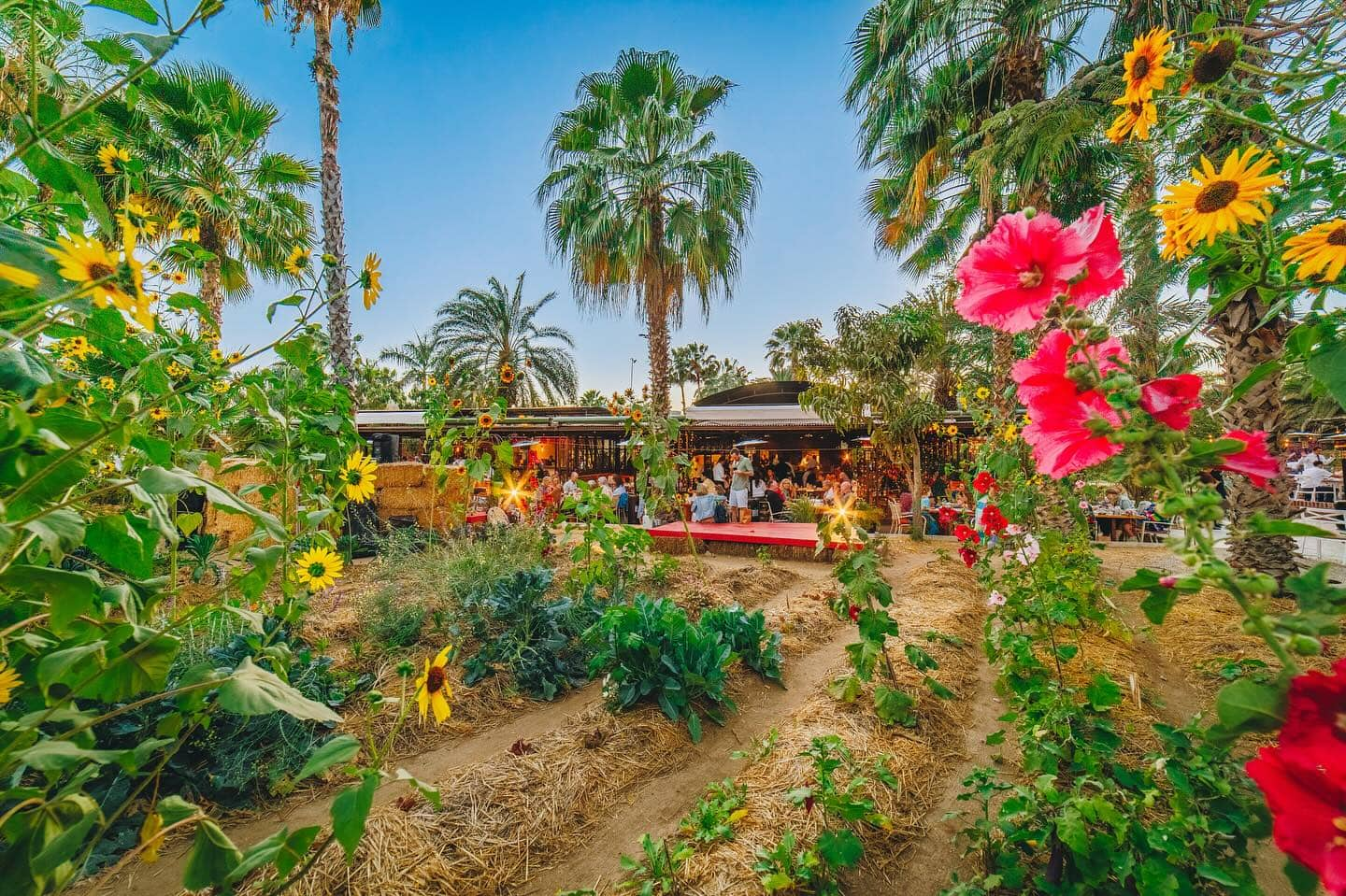
Cabo’s culinary scene goes way beyond tacos and tequila (though we love those too).
For a special meal, Los Cabos’ amazing farm-to-table restaurants grow much of their own produce right on-site – so your salad may have been picked just hours earlier!
Top recommendations:
- Near San Jose del Cabo – Flora Farms and Acre, set in lush gardens
- In Cabo San Lucas – El Huerto
➡️ Expect beautifully plated dishes, creative cocktails and a magical setting that’s both rustic and refined. Just bring a credit card with a big spending limit!
Ready for Cabo now?
Whether you’re soaking up the sun on a swimmable beach, savoring farm-to-table tacos or sailing past El Arco, these tips should help make your first Cabo vacation smoother, safer – and way more fun. Buen viaje!
More Cabo trip planning tips
- How to Plan Your Cabo Vacation
- 8 Ways to Get Around in Cabo: From the Bus to Uber
- Is it Safe to Travel to Los Cabos?
- Tipping in Cabo: Don’t Be That Tourist!
- Renting a Car in Cabo
- What to Pack for Your Visit to Cabo
- 15 Cool Cabo Souvenirs (and Where to Buy Them)
- Can You Drink the Water in Cabo?
- The Best (and Worst!) Time to Go to Cabo
- How Much Should You Budget For Cabo?
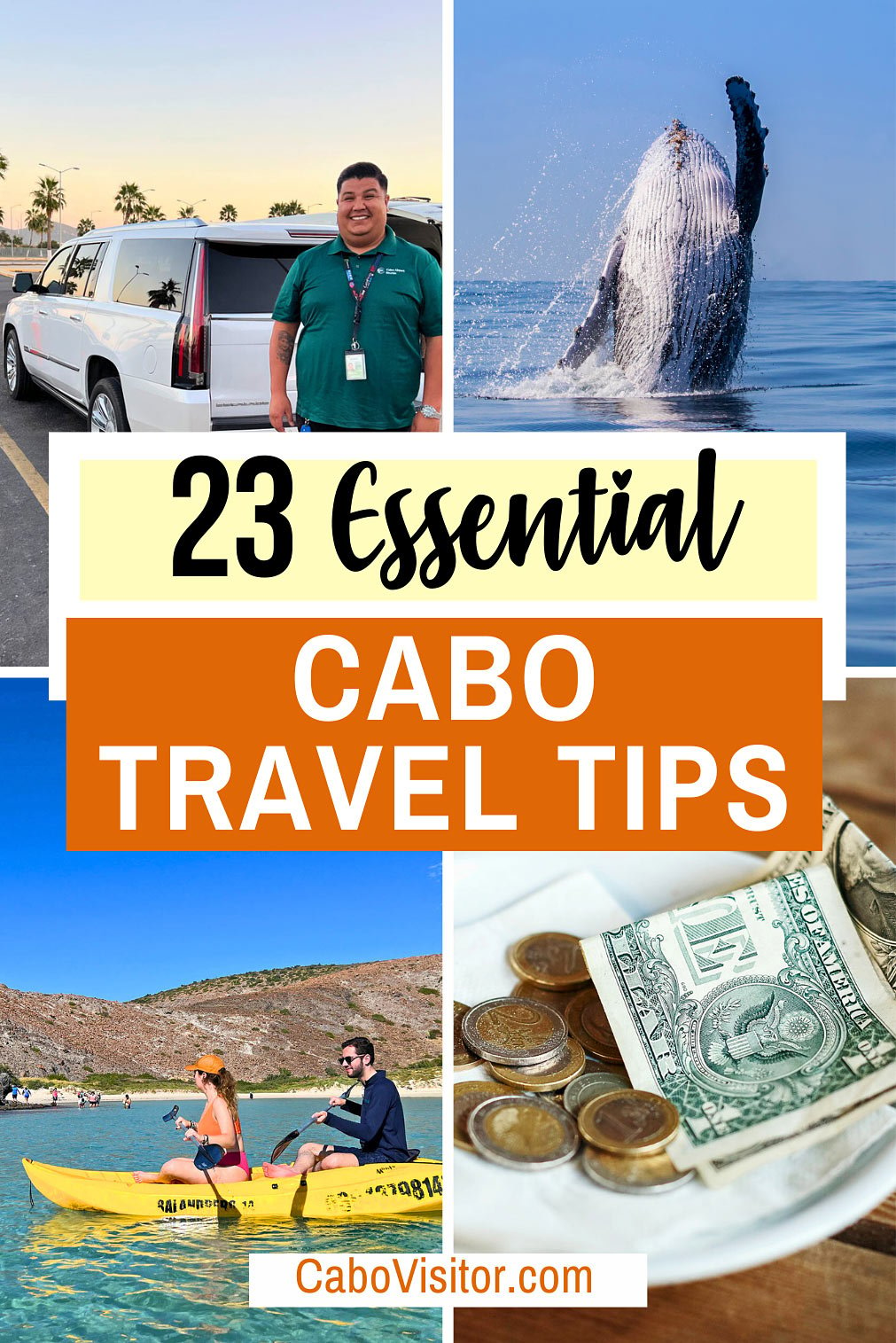
Our favorite resources for planning a trip to Cabo
Resorts: Booking.com is great for scoring a “wow” hotel in Cabo – or at least a decent one. (We especially like their flexible cancellation policy!) Expedia is also worth checking for discounted hotel rates in Cabo.
Vacation homes, condos and rentals: We prefer and use Vrbo (Vacation Rentals by Owner).
Tours: For the best local guided tours in Cabo, see Viator and GetYourGuide.
Car rental: Renting a car in Los Cabos is one of the best ways to explore. Discover Cars searches car rental companies so you get the best rates.
Travel insurance: SafetyWing is designed for frequent travelers, long-term adventurers and digital nomads. It covers medical expenses, lost checked luggage, trip interruption and more. We also have and recommend Medjet for global air medical transportation and travel security.
Need more help?
- See our Start here page. It lists everything we’ve written on Cabo.
- Also check our ultimate Cabo travel guide and our article on Planning your Cabo vacation: What you should know.
Pssst! If you make a booking or purchase through our site, we may earn a small commission (at no cost to you). Thanks!
About the authors
